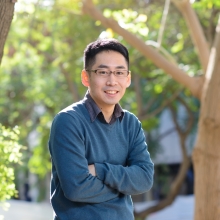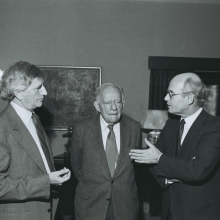Harvesting harmonious energy
Dr. Sivan Refaely-Abramson works at the intersection of chemistry, physics, and materials science
New scientists

The best semiconducting, solar-powered devices, operated under ideal laboratory conditions, can only convert about a third of the energy they collect from sunlight into usable electricity.
Research to improve such photovoltaic efficiency requires complex computational models of advanced new materials to find just the right mix of features—e.g., temperature, structural arrangement, phase—to discover new methods for harvesting, converting, and storing sunlight as a renewable energy source.
“Symmetry is beautiful,” says Dr. Sivan Refaely-Abramson, a computational scientist and theoretician, working at the intersection of chemistry, physics, and materials science. Symmetry lies at the heart of molecular interactions and is fundamental to observations in quantum science. An elegant, harmonious arrangement of material properties lies at the heart of Dr. Refaely-Abramson’s research on applying theoretical computational approaches to questions in quantum science for various purposes. These include renewable energies, light-matter interactions, and machine learning.
Dr. Refaely-Abramson characterizes the back and forth between theoreticians (like herself) and experimentalists in chemistry and physics as a collaborative game. The players are trying to determine how different material properties and observable dynamic variables can be selected, organized, and arranged to produce the most effective materials.
In many semiconducting materials with photovoltaic potential, the absorption of a photon excites an electron, which in turn leaves behind a positively charged “hole” (saying “electron X was here”). The excited electron and its hole attract and bind one another, generating what is known as an “exciton.” Excitons, for their part, serve as carriers in the energy transfer process. Dr. Refaely-Abramson aims to assist in the worldwide effort to increase the conversion yield of solar devices by developing a better understanding of the properties and dynamics of excitons.
Exploring these complex properties and dynamics requires powerful computational resources and sophisticated algorithms to seek out accuracy. Dr. Refaely-Abramson will lead efforts to harness and enhance computational infrastructure at the Weizmann Institute, and thereby take the theoretical/experimental game to the next level. Using a combination of computational approaches, she aims to track the dynamic quantum properties of materials and innovate design rules for structures and symmetries that optimize those properties. Her experimental colleagues can then apply these properties to a range of applications, including renewable energies, time-
resolved optical measurements, and even quantum computing.
Dr. Refaely-Abramson, who earned her PhD in the department she just joined, is thrilled to get back into the game at the Weizmann Institute. As she says,
Bio
Dr. Sivan Refaely-Abramson earned her BSc magna cum laude in the Exact Sciences Combined Honors Program (chemistry and physics) at the Hebrew University of Jerusalem in 2007. She earned her MSc (2011) and PhD (2015) at the Weizmann Institute of Science, under the supervision of Prof. Leeor Kronik in the Department of Materials and Interfaces. She then completed a postdoctoral fellowship at the University of California, Berkeley, and at the Lawrence Berkeley National Lab, where she studied advanced first-principles calculations of excited-state phenomena in complex systems, under the guidance of Prof. Jeffrey Neaton.
Dr. Refaely-Abramson has published and presented extensively on excited-state phenomena, and has received numerous awards and honors for her research, including the Rothschild Foundation and Fulbright-Ilan Ramon postdoctoral fellowships, as well as the Israel National Postdoctoral Award for Advancing Women in Science. She is married with three children.
Dr. Refaely-Abramson is supported by the Ilse Katz Institute for Material Sciences and Magnetic Resonance Research, and the Abramson Family Center for Young Scientists.








